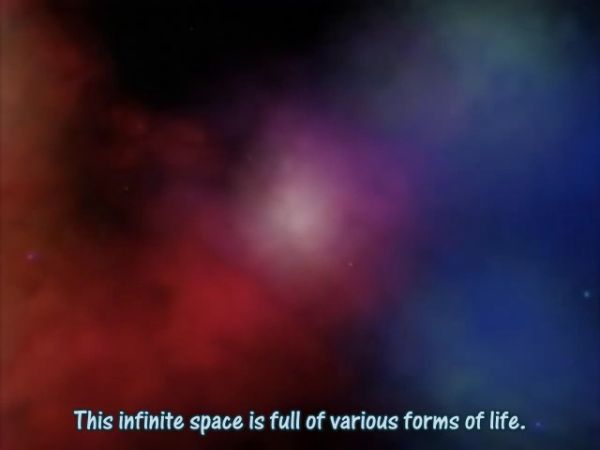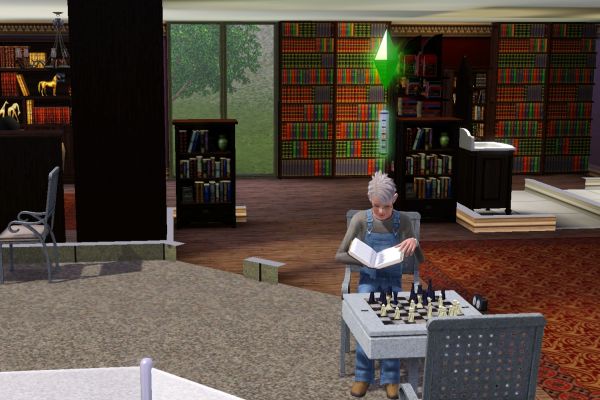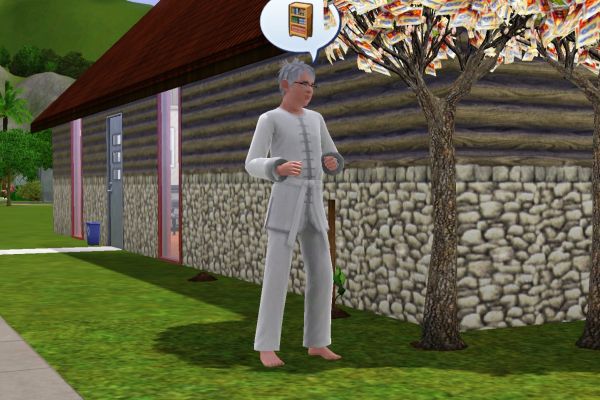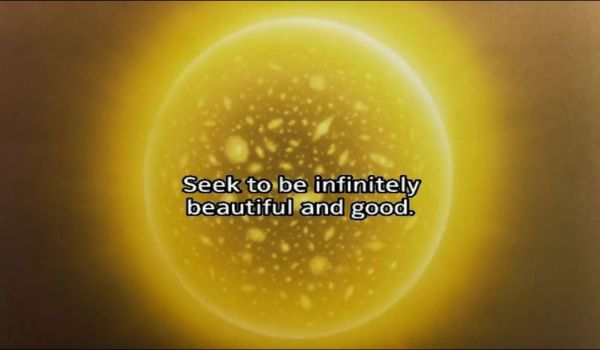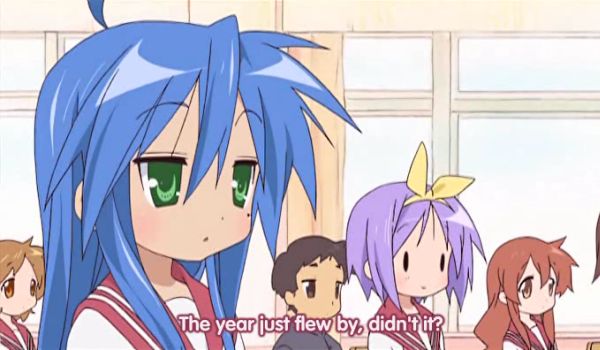
Yes, the years just fly by when you’re watching anime, playing games, or doing other things that are mutually exclusive with self-reflection. (Well, actually Lucky*Star is an anime that may give some pause for thought, although not on a Socratic level, I dare say.)
“The unexamined life is not worth living” said Socrates, but not until today have I reflected on the context of those words: Socrates was threatened by the government to give up his public teaching of philosophy or else be sentenced to death. But he chose rather to die than to go against his “daimon” (or daimonion), the spiritual voice he had obeyed since his childhood and which he considered a gift from Heaven.
Most of us hold the opposite view: The examined life is not worth living. It seems to us so unbearable that we will go to great length, even a high risk of untimely death, to avoid it.
***
What is this examination of which Socrates speaks? We call Socrates a philosopher, which he certainly was. But speculating on whether the Earth originated in water or fire, or any such remote topic, hardly changes the “examination level” of our life. You cannot say that after having discussed how many angels can dance on the tip of a needle, you have examined your life.
In contrast, self-reflection is all about examining our life. When a child in Japan misbehaves, its parent may tell it to sit alone and reflect on what it did. (Well, it happens in non-religious anime, so it is probably widespread.) This awareness of one’s own behavior, as if seen by an outside observer, is also one element in the Jewish and Christian concept of repentance, although this one focuses more on the act of turning away from mistakes rather than on the pure observation.
Boris Mouravieff, claiming to write from an esoteric Orthodox Christian tradition, puts the pure observation of oneself as the primary spiritual practice, the tool of transformation. The act of paying attention to oneself (in particular to the fragmented nature of the personality, which changes like a kaleidoscope with time and opportunity) is in itself the driving force of transcending the fragmented false self, causing a “heat” to develop in the bucket of iron filings with which he likens the natural personality. If this is raised to a high degree, the fire melts the pieces together. Be that as it may, the relentless observation of the personality is in itself the recommended spiritual practice.
There are hints that this may be original Christian teachings. Jesus Christ exhorts his disciples to “watch at all times”. The statement appears repeatedly in the formula “watch and pray”, always in that order, blended with other words but with these being the direct instructions. For some reasons the “pray” has completely overtaken the “watch” in modern Christianity, so that it has fused with the “pray without ceasing” mentioned by St Paul the apostle. However, in the repeated sayings of Jesus – and this is in fact one statement he clearly and intentionally repeats, as if it was a key point of his teaching – there is always a “watch” first.
It is possible that Paul also thinks in this direction when he tells a younger preacher to “pay attention to yourself and the teaching”, which may refer to comparing himself to the measuring rod of the Christian teachings, or it could mean paying attention to the teachings he preached. Perhaps both. But clearly it was necessary to pay attention to himself – that is to say, examine his life. Reflect on himself. Watch.
In some languages (including my native Norwegian) the “watch” of the gospel is translates as “stay awake”. One relative of mine ran into mental disturbances trying to stay awake all night every night to pray. Intriguingly, a few people in this world have the ability to remain conscious even in their sleep, in a purely observing, non-acting mode. This usually appears after a couple decades of daily meditation of the more advanced sorts. It occurs to me today that Jesus may have lived like that, conscious and watching his own mental plane or “innerscape” even in his sleep.
If we translate ye olde phrase of Jesus into the language of the 21st century, we might say “be conscious at all times and stay connected to the Divine”. This sounds a lot less offensive to people with Jesus willies, although I am not sure whether this is a good thing. It also happens to pretty accurately portray good old Socrates, who not only examined his life even in the face of death, but also publicly spoke about the divine presence which had accompanied him since childhood and never let him down. Such faith did he have in his daimonion that when it did not warn him as he was sentenced to drink a deadly poison, he concluded that it was probably no bad thing.
***
Far from consciously observing ourselves even in our sleep, however, most of us do the exact opposite: We look away even when awake. Hold on a minute, my sims need to harvest their watermelons. OK, back. As I was saying, we tend to distract ourselves from the “life examination” by disappearing into engrossing hobbies like computer games or puzzles, or (for the more simpleminded perhaps) basic instincts like FOOD! and SEX! – not sure if socializing with other people also count as basic instinct with humans, quite possibly it does. It certainly is effective at distracting us from observing our own thoughts, words and deeds. So our lives remain unexamined, and that’s the way we like it, uh huh.
Some people cannot stop the relentless intrusion of reality simply by sex and petty crime. They have to drink booze or take hard drugs to try to forget. This is the last step before suicide itself – for in their eyes, the examined life is not worth living. Or at least living through the process of examination is not worth it. But as I pointed out just above, I feel that there is only a difference of degree between them and us.
That is not to say that God hates games as such, or even sex. OK, at least not all sex. But the use of anything as an escape route to avoid self-reflection, to shirk the burden of self-consciousness (much less God-consciousness), to flee from the examined life and stay in the dark – like someone who turns on the light, sees a big spider on the pillow and decides to turn off the light – that is probably not the best idea.
Whatever happens when you examine your life, it made Socrates so happy that he could not stop talking about it, even if it should cost him his life. The same happened to Jesus’ disciples some centuries later. It doesn’t seem to have made the Dalai Lama particularly depressed either. It seems that all true religion, in the sense of spiritual religion rather than just social or ritual religion, must contain this element. But getting there… that is the hard part.
I have watched enough to watch myself flee from my own watchful eye. Because I find the unexamined life quite worth living. And the terrible truth is that the unexamined and the examined life cannot both exist at the same time. For the new, examined life to live, the old unexamined life must die. It may well do so whether we want it to or not, if we keep observing it. This may be one of the cases where looks really can kill. At least they can be quite painful.
But first, my sims need help with their potatoes.




